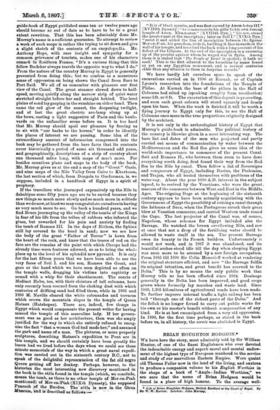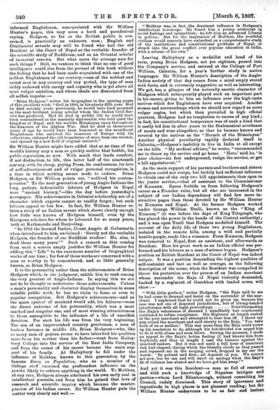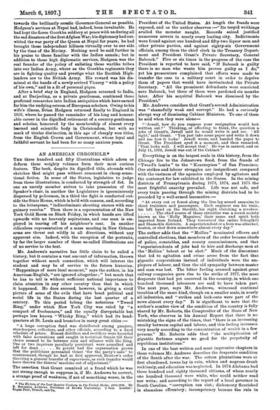BRIAN HOUGHTON HODGSON.*
WE have here the story, most admirably told by Sir William Hunter, of one of the finest Englishmen who ever devoted the indomitable energy and superb moral and mental endow- ment of the highest type of European manhood to the service and study of our marvellous Eastern Empire. Were quaint old Thomas Faller now in the land of the living, and anxious to produce a companion volume to his English Worthies in the shape of a book of " Anglo - Indian Worthies," we are sure that the name of Brian Hodgson would be found in a place of high honour. To the average well- • Life of Brian Houghton Hodgson, British Resident et the Court of Repel. By air W. W. Hunter. London: John Horny,
informed Englishman, unacquainted with Sir William Hunter's pages, this may seem a hard and paradoxical saying. Hodgson, so far as the British public is con- cerned, is practically an unknown man ; English and Continental savants may still be found who hail the old Resident at the Court of Nepal as the veritable founder of the scientific study of Buddhism, and as an Oriental scholar of immortal renown. But what cares the average man for such things P Still, we venture to think that no one of good intelligence could rise from the perusal of this book without the feeling that he had been made acquainted with one of the noblest Englishmen of our century,—one of the noblest and rarest men in any country and any period, the type of man richly endowed with energy and capacity who is yet above all mere vulgar ambition, and whose ideals are dissociated from all selfish impulse :-
"Brian Hodgson," writes his biographer in the opening pages of this excellent work, " died in 1894, in his ninety-fifth year. Had he died seventy years previously, he would have been mourned as the most brilliant young scholar whom the Indian Civil Ser- vice has produced. Had he died in middle life be would have been remembered as the masterly diplomatist who held quiet the kingdom of Nepal and the warlike Himalayan races throughout the disasters of the Afghan War. Had be died at three-score years of age he would have been honoured as the munificent Englishman who enriched the museums of Europe with his collections, enlarged the old boundaries of more than one science, and opened up a new field of original research."
Sir William Hunter might have added that at no time of the world's history may a man so quickly outlive that bubble, his public reputation, as now. With much that lends comfort, if not distinction, to life, this latter half of the nineteenth century, with its cheap, prying Press, its restlessness, its love
of self-advertisement and of vulgar personal recognition, is a time in which nothing seems made to endure. Brian Hodgson, as Sir William points out, " outlived his contem- poraries." To the next generation of young Anglo-Indians the
brig, patient, indomitable labours of Hodgson in Nepal were "ancient history,"—like the day before yesterday's newspaper. His achievements in Oriental scholarship are of a
character which experts cannot so readily forget ; but such labours appeal to but few. In fact, Sir William Hunter re- lates a story of an Italian savant which shows clearly enough how little was known of Hodgson himself, even by the European scholars for whom he laboured for so many years, both at Kathmandu and Darjeeling.
" In 18S3 the learned Italian, Count Angelo di Gubernatis, when introduced to him, exclaimed : 'Surely not the veritable Hodgson, the founder of our Buddhist studies ! He, alas, is dead these many years.' " Such a remark as this coming from such a source amply justifies Sir William Hunter for adding this " Life " to the enormous number of biographical works of our time ; for few of these works are concerned with a man so worthy to be remembered, and so little generally known, as Brian Hodgson.
It is the personality rather than the achievements of Brian Hodgson which, in our judgment, entitle him to rank among the very greatest of Anglo-Indians. In saying this we are not to be thought to undervalue those achievements. Unless a man's personality and character display themselves in some notable public work, he has no claim to fame or even to
popular recognition. But Hodgson's achievements—and as -the more cynical of mankind would add, his failures—were the direct outcome of his personality, which was a most marked and singular one, and of most winning attractiveness to those susceptible to the influence of a life of unselfish devotion. For such his life was from the very beginning.
The son of an impoverished country gentleman, a man of broken fortunes in middle life, Brian Hodgson—who, like so many men of genius, seems to have inherited his qualities more from his mother than his father—went from Halley- bury College into the service of the East India Company, and from the outset of his career became the main sup- port of his family. At Haileybury he fell under the
influence of Malthus, known to this generation by the famous Essay on Population, who as a member of a College staff exercised the profoundest influence on the
youths likely to achieve anything in the world. To Malthus, at any rate, Hodgson always attributed his own early zeal in intellectual pursuits, and from him he gained that love of research and scientific inquiry which became the master- pathion of his Indian career. Sir William Hunter puts the a:latter very clearly and well
"Malthus was, in fact, the dominant influence in Hodgson's intellectual horoscope. He found him a young aristocrat in social feelings and sympathies; he left him an advanced Liberal in politics. But for the inspiration of Malthus, the youthful civilian would scarcely have embarked on a comprehensive study of the institutions and constitutional problems of Nepal, or struck into the great conflict over popular education in India, with a scheme of his own."
Leaving Haileybury as a medallist and head of his term, young Brian Hodgson, not yet eighteen, passed into the Company's service, and entered at the College of Fort William, Calcutta, for a year's further study in native languages. Sir William Hunter's description of the Anglo-
Indian society of that day comes from a mind amply stored with facts, and is extremely suggestive as well as interesting. We get, too, a glimpse of the naturally ascetic character of Hodgson which subsequently played such an important part in his career, giving to him an influence over the high-caste natives which few Englishmen have ever acquired. Amidst
scenes and surroundings which we should now regard as mere vulgar orgies, but which then prevailed in high official quarters, Hodgson had no temptation to excess of any kind ; in fact, his constitutional temperance was of such a kind that it easily led him in after years to the Brahmanical avoidance of meats and wine altogether, so that he became known and revered by the natives as the "Hermit of the Himalayas."
Another physical peculiarity rapidly declared itself in Calcutta,—Hodgson's inability to live in India at all except on the hills. " My medical adviser," he wrote, "recommended me to throw up the service and go home. Here,' said he, is your choice—six feet underground, resign the service, or get a hill appointment.' " As the main support of his parents and brothers and sisters Hodgson could not resign, but luckily had sufficient influence to obtain one of the only two hill appointments then open to the junior service,—that of assistant to the Commissioner of Kumaun. Space forbids us from following Hodgson's career as a Frontier ruler, but all who are interested in the subject of our Indian dependency will find few more in- structive pages than those devoted by Sir William Hunter to Kumaun and Nepal. At the former Hodgson worked under George William Traill, known as the "King of Kumaun" (it was before the days of King Telegraph, who has placed the power in the hands of the Central authority); and it was upon Trail that Hodgson modelled himself. The
account of the daily life of these two young Englishmen, isolated in the remote hills, among a wild and partially
hostile people, reads like a romance. From Kumaun, Hodgson was removed to Nepal, first as assistant, and afterwards as Resident. Here his great work as an Indian official was per- formed and his labours as a man of science begun. Hodgson's position as British Resident at the Court of Nepal was indeed unique. It was a position demanding the highest qualities of self-restraint and tact as well as courage, as the following description of the scene, when the Resident was compelled to throw his protection over the person of an Indian merchant whose surrender the Raja of Nepal violently demanded, backed by a regiment of Goorkhas with loaded arms, will show:—
" With little preface," writes Hodgson, "the Raja said to me he had come to demand and insist on the surrender of the mer- chant. I explained that he could not be given up, because the case was not one of disputed jurisdiction, but of strong-handed interference with all legal proceedings. . . . . . Notwithstanding the Raja's vehemence of demand I steadfastly but courteously continued to refuse compliance. His Highness at length rushed at the poor merchant and attempted to bear him off. I threw my arm round the merchant and said sternly to the Baja, ' You take both of us or neither.' This was more than the Baja could screw up his resolution to do, although his hot-blooded son urged him to do it with abuse and even blows. Seizing the moment, I made an appeal to the Raja's better feeling (I had known him from boyhood), and thus at length I cast the balance against the mischief-makers. But it was not until a full hour of imminent risk had elapsed, during which the friendly chiefs as they passed and repassed me in the surging crowd, dropped in my ear the words : Be patient and firm ; all depends on you. We cannot act now, but we can and will exact an apology when the Baja's fit of violence has abated and we have got him away."
And yet it was this Resident—a man so fall of resource and with such a knowledge of Nepalese intrigue and
parties—whom Lord Ellenborough, without consulting his Council, rudely dismissed. This story of ignorance and ingratitude in high places is not pleasant reading; but Sir William Hunter endeavours to be as fair and lenient towards the brilliantly erratic Governor-General as possible. Hodgson's services at Nepal had, indeed, been invaluable. He had kept the fierce Goorkha soldiery at peace with us during all the sad disasters of the first Afghan War; his diplomacy had out- witted the war party of the Queen at Nepal for years; he bad brought these independent billmen virtually over to our side by the time of the Mutiny. Nothing need be said further in his praise to those familiar with the Indian annals ; but in addition to these high diplomatic services, Hodgson was the real founder of the policy of enlisting these warlike tribes into our Indian Army, where as the Goorkha regiments they are in fighting quality and prestige what the Scottish High- landers are to the British Army. His reward was his dis- missal at the hands of a newly arrived Viceroy " with a policy of his own," and in a fit of personal pique.
After a brief stay in England, Hodgson returned to India, and at Darjeeling, as a private gentleman, continued those profound researches into Indian antiquities which have earned for him the undying esteem of European scholars. Owing to his wife's illness, Brian Hodgson returned finally to England in 1858, where he passed the remainder of his long and honour- able career in the dignified retirement of a country gentleman and scholar, honoured by the membership of almost every learned and scientific body in Christendom, but with no mark of titular distinction, in this age of cheaply won titles, from the English Crown and Government, whose loyal and faithful servant he had been for so many anxious years.








































 Previous page
Previous page